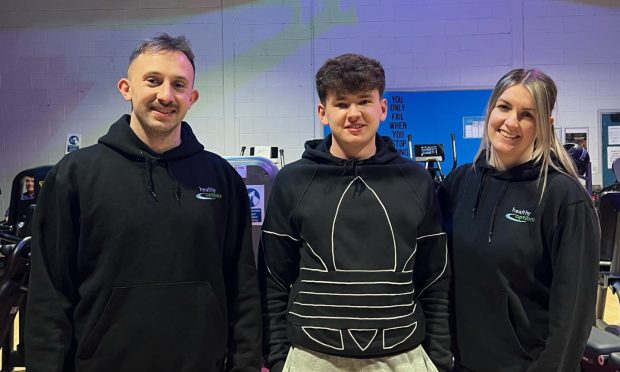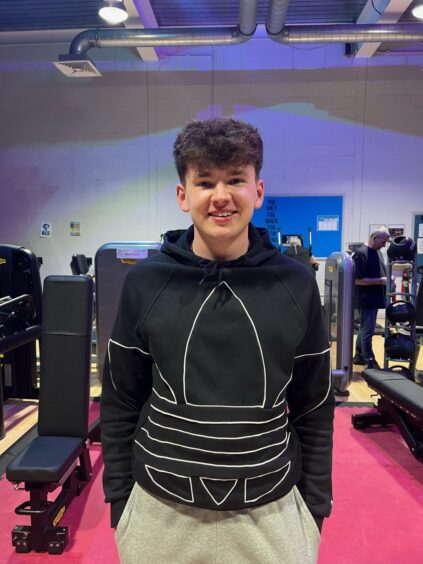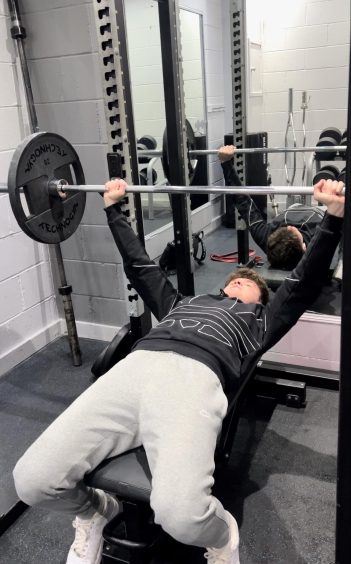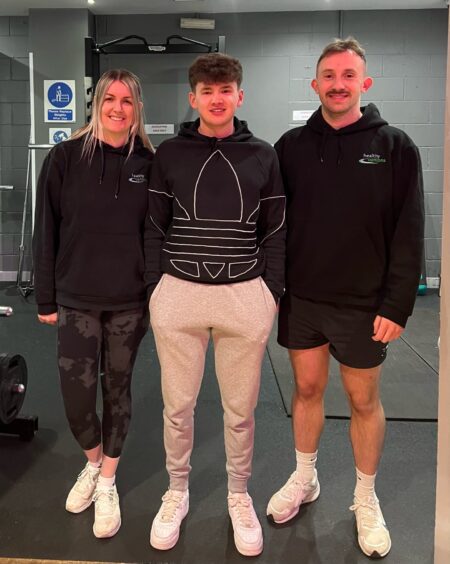
For a long time after the accident, Adam Welsh could still hear the sound of tyres screeching when drove round corners.
The teenager, from Oban, was 17 when he crashed his car on March 6 last year.
“I went round a corner a bit quick and crashed and flipped the car, which then went across the road on its roof and rolled down a bank,” he explained.
“I can remember bits, but it’s patchy. I remember trying to get out the car but the door was jammed so I had to put down the window and climb out. There were two guys in the car behind me, then a pal’s mum was driving past so she stopped and came down. After however long, I don’t know, the ambulance and the police arrived. I am lucky that those people were behind me, because I was in no place to call for help myself.”
The impact of the crash
Adam was transported to Oban hospital by ambulance, then quickly moved to ICU at Queen Elizabeth in Glasgow, then into a major trauma unit.
“I had fractured the top five vertebrae in my spine, I had broken my nose and cheek bones, a few ribs and I had to get a skin graft on the top of my head because I had lifted a chunk of skin there,” said Adam.
“The crash happened on the Monday and I went into surgery on the Friday. I either had a chest infection or got one while in hospital, because I was intubated for the surgery and when they tried to extubate me, I couldn’t breathe by myself because my throat had swollen. I was put into an induced coma for a week or two. ”
It took three attempts to successfully wake Adam from the coma. He spent the next three months in hospital, with his mum sleeping in a reclining chair by his side.
Getting moving again
Adam had been fit, a regular gym goer, but his time spent in hospital changed that in a matter on months.
“I was in a neck and back brace thing to stop me hurting anything and also on bed rest for months, so my posture had got really poor, I was quite hunchbacked,” he said.
“It was hard. I went from gymming up to six times a week to not being able to get out of bed. I couldn’t go to the toilet myself, I couldn’t do anything. Also, when they extubated me it damaged my vocal chords and swallow function, so I couldn’t eat, I was fed by a tube through my nose for months.”
Once he was able to, Adam started doing physiotherapy at the hospital to improve his mobility. When he was ready to move back to Oban, he was referred to Lorn Healthy Options.
Healthy Options is a charity that helps people learn the skills to improve their own health, wellbeing and quality of life. It uses movement to support those suffering from life-long health conditions or, like Adam, who are recovering from a stay in hospital.
“I had heard about Healthy Options before because I had seen them in the gym,” said Adam.
“I knew it was predominantly for older people, so I was a bit hesitant at first, but I went for a consultation with Rob Graham. I asked if I would just be doing steps and things, but he assured me it would be like the physio I was doing before. I was quite happy about that, so I started on the Adapt programme.”
Seeing progress
Since coming out of hospital, Adam has been going to gym and strength classes four times a week. Though he was initially reluctant to join, being the youngest in the group has its perks.
Adam said: “They get to know you and it feels like they care. I am more of less back to where I was now. It has got busier since I started so I offered to leave to give others a spot, but they said I was welcome to stay as long as I wanted to. I am really grateful for that.
“It’s an older demographic but I have made quite a few friends. I have a few girlfriends in there as well.”
Cameron Johnson, an exercise professional at Healthy Options who has worked closely with Adam throughout his recovery, said: “Adam has been extremely keen to learn in the gym and he has been fully dedicated to his rehabilitation. He has taken an interest in learning more about resistance training by watching videos and listening to podcasts and even took out his own gym membership to go over the weekend.
“Adam has made a significant improvement to his self-confidence and has come out of his shell. Progression has been impressive – Adam has gained a lot of lean tissue since starting the programme as well as eating a cleaner diet to aid in training and recovery.”
A new lease of life
The last year hasn’t been a straight road, but Adam feels he is almost back to the level of fitness he was at before. He agreed that his confidence has also grown as a result of his time at Healthy Options.
He said: “I still had two quite big scars under each eye from where they had put metal plates in. I had split my lip and had a big gash on the top of my head and had lost a lot of weight too, so my clothes were big and baggy. Getting back into the gym and putting on that muscle again was a big thing for me. Especially at 17 and 18 years old, how you look feels important.”
Adam spent his 18th birthday in hospital, but says he has “more than made up for” missing the big night since. He is also back behind the wheel, a challenge he is glad he overcame as soon as possible.
Though he feels like his old self physically, his outlook on life has changed. The accident meant he missed his final exams at school, so he is working in Marks and Spencer until he decides what he wants to do with his future.
“I didn’t know at the time, but from what I have been told it was quite close to me not being here to talk about what happened,” he said.
“It has changed my outlook on life. I don’t take things for granted, and it sounds cheesy but I feel like I am meant to be here, I have a purpose now. Obviously, I don’t know what I want to do yet, but there’s something out there for me.”
Active Wards Special Interest Group
The movement and exercise classes at Healthy Options helped Adam get back to his usual self after his accident, and this is something more and more healthcare professionals are trying to encourage both in and after hospital.
Juliet Harvey and Erin Walker are physiotherapists and co-lead the NHS Greater Glasgow & Clyde Active Wards Special Interest Group.
“We are looking at how we can reduce unnecessary time spent sitting or lying in bed during hospital admission,” explained Erin.
“We want to displace that with as much physical activity as possible, thinking about the individual themselves and tailoring movement to their needs. Patients need to know that they have permission to move too. What we are trying to do is avoid deconditioning – the decline in physical function of the body as a result of physical inactivity – because that has a negative effect and very quickly in terms of both physical and mental health.”
Juliet said there are multiple ways older people can get up and moving in hospital and at home, preventing or easing the effects of deconditioning.
“Since Covid we are seeing a lot of patients coming into hospital already quite deconditioned, having lost their fitness and ability to go out and socialise,” she said.
“Those who are of the generation of thinking that you got to bed until you feel better if you are unwell maybe don’t realise the value of being up and moving around. We want to educate people on the importance of that.”
Juliet added: “It can be as simple as getting up every hour and having a walk or a stand if they are able, or getting up to brush their teeth or wash their face. For a lot of people, we are not talking about doing exercise, it’s movement to break up sedentary periods.”

Enjoy the convenience of having The Sunday Post delivered as a digital ePaper straight to your smartphone, tablet or computer.
Subscribe for only £5.49 a month and enjoy all the benefits of the printed paper as a digital replica.
Subscribe © Supplied by Lorn Healthy Options
© Supplied by Lorn Healthy Options © Supplied by Lorn Healthy Options
© Supplied by Lorn Healthy Options © Supplied by Lorn Healthy Options
© Supplied by Lorn Healthy Options